The
Jazz Singer
1927
Director: Alan Crosland
Starring: Al Jolson, May McAvoy
There
are many reasons that films are considered “Must See.” For many, it’s some certain inherent artistic
merit. For a few, it’s historical
relevance. In my opinion, The Jazz
Singer may not be loaded with artistic merit, but there is no denying
its historical relevance.
Jakie
Rabinowitz (Jolson) is the son of a cantor, and his family is very active in
their synagogue. His father has trained
Jakie in music with the intent of him taking over as cantor one day, but Jakie
loves to sing jazz. This eventually
causes his father to disown him, and Jakie changes his name to “Jack Robin” and
takes his act on the road. Striking it
big as a performer and meeting a pretty girl along the way (McAvoy), eventually
Jakie returns home to New York City to make his Broadway debut and tries to fix
things up with his pa. Naturally the
conflict between family and career is only heightened.
The
story is pretty standard, blatantly overtly sentimental fare. The acting is not acting but over the top
mugging. To quote my teenaged students,
“not gonna lie,” it gets pretty boring. The
Jazz Singer is NOT gripping entertainment. It’s tough, especially when I compare it to
some of the stand out silent films from 1927, like Sunrise, The General, The Unknown,
and Metropolis. The Jazz Singer falls so
spectacularly flat in comparison. So to
me, if you’re looking for entertainment, go elsewhere, because I found precious
little of it in The Jazz Singer.
And
curiously, perhaps I should respond to the story because estrangement is,
unfortunately, a very real part of my immediate family history (and that’s all
I’m going to get into here). But there
was no wailing, no gnashing of teeth, no tearing of hair in the estrangement in
my family. Perhaps, then, I don’t react
well to films that depict it in this way.
Kind of a “been there, done that, doesn’t look at all like you’ve
portrayed it in your film.” So despite
what SHOULD be a bit of a personal connection to the story, I found absolutely
none.
But
I will never quibble with The Jazz Singer’s inclusion in any
kind of list that deals with significant film.
It’s hard to argue with “first feature length film that included sound.” There was no one change that so utterly
altered the landscape of film as the addition of sound, and The
Jazz Singer is a huge part of that change. It wasn’t that it was the first film to have
sound (there were shorts that preceded it that had audio songs), but its
enormous popularity – and the boatloads of money it made – signaled to the film
industry that audiences would eat up “talkies.”
A misconception to the general public is that The Jazz Singer is the
first all-sound film when it’s really a combination silent/sound film, with
nearly all the dialogue and dramatic scenes done in traditional silent film
style with intertitles, but the musical numbers are in sound. Originally only intending to include sound
for the musical numbers, Jolson improvised a dialogue scene with his mother in
between singing. This then made The
Jazz Singer the first film with recorded dialogue. When I first saw The Jazz Singer, I was
seeing films chronologically by decade.
I had been immersed in silent films (a fact that helped me appreciate
them better), and in all honesty, when Jolson talks to his mother, it was
rather magical. I can understand why
audiences at the time couldn’t get enough.
As Jolson famously ad-libbed, “You ain’t heard nothin’ yet!”
Beyond
its use of sound, however, The Jazz Singer also gets credit for
single-handedly inventing the movie musical.
After all, you can have silent comedies and silent dramas, but there’s
no way to make a silent musical. The first
sound picture burst on the scene with song and dance, and birthed an entirely
new genre. Vaudeville singers and
dancers found they had a place in Hollywood too. The outline of the backstage musical that The
Jazz Singer presents would be used again and again (and again and again
and again) throughout the ages – young person/couple/group has talent, starts
small, takes it on tour, gets a following, gets an opening in The Big Show,
gets opening night jitters and/or various complications, performs anyway and
knocks it out of the park. I honestly
won’t bore you with listing the films that use this general motif because they
are too many. And as a musical fan
myself, it’s important for me to appreciate that they all stem from The
Jazz Singer. There is no arguing
with that.
This
much is known pretty well to people who are aware of The Jazz Singer’s
historical significance. What I had
forgotten about, however, was the fact that this story plays out against the
backdrop of a traditional Jewish family.
I am not Jewish, but I have seen a lot of movies, and I have to say The
Jazz Singer’s portrayal of Jewish customs *seems* authentic (but again,
I am no expert, I am simply comparing it to other, perhaps more cartoonish
cultural representations). Moreover, no
one really makes a big deal that Jakie is Jewish. You could substitute in any religion and/or
culture, and you’d have the same story. Heck,
you could simply substitute in overbearing traditionalist father and leave
religion out of it, and you’d have the same story. And that’s a good thing. This is representative of a cultural
acceptance that is, frankly, a bit odd to find in a Hollywood movie from the
1920s (tempered, most definitely, by the blackface scenes, but still accepting in a way). Odd, but refreshing.
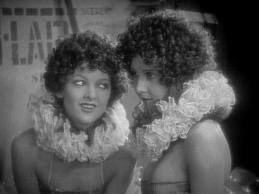 |
| Heck, Myrna Loy even pops up! |
The
Jazz Singer
is a film that I can’t in good conscience recommend. For those who have a passion for film
history, yeah sure, see it, knock yourself out.
For the casual film fan, really, there’s no need to see it. You’ve seen the same story played out in so
many other films with better acting.
Unless the novelty of its historical significance sounds super
intriguing to you because you’re OCD about film lists like me, this one
warrants a pass.
Arbitrary
Rating: 4/10.
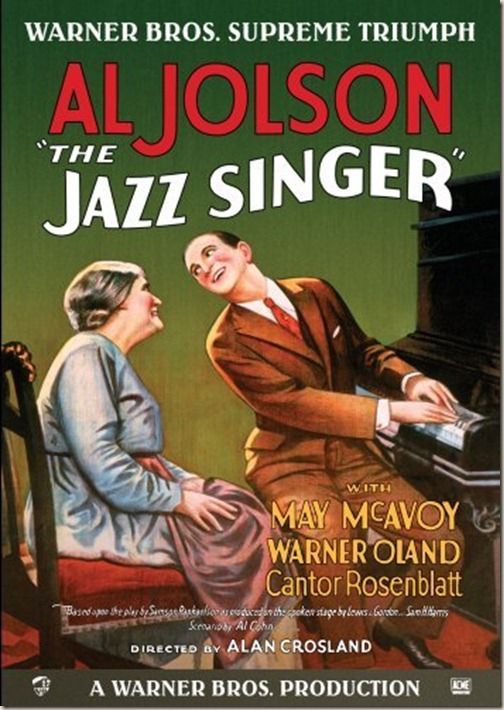
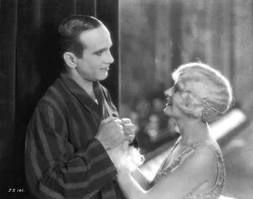
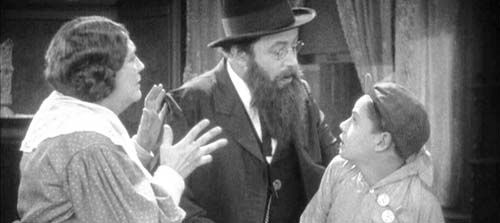
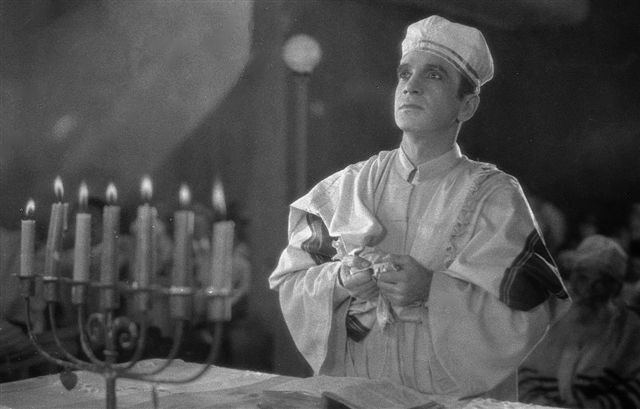
Completely agreed. There's nothing that special about this film except for its use of sound. If another film had been first, no one would care about The Jazz Singer anymore, because it's otherwise not that memorable.
ReplyDeleteThe first time I saw it, my opinion was even worse - I was expecting SO much more than I got. This a film that got lucky more than anything else.
DeleteAs probabbly the only person in the universe I quite like The Jazz Singer for its own sake. I expected a gimmick film (the first to use sound), but got an easy, enjoyable film with an interesting story element. The acting is mediocre and the songs are not spectacular, but there is an easy flow to it and Al Jolson was quite a hit it in his time. What I liked however was the parent-child conflict story element. I am quite the sucker for that story element and here the core of the problem is a parent who takes his religion/tradition more importantly than his family. I admit that this is not most insigtful and deep examination of that conflict, but it is enough for me to find it interesting. Besides come on, just look at the number of firsts this film came up with?
ReplyDeleteWhile parent-child conflict story isn't a draw for me, I know what it's like to feel an attraction to a certain story element. Personally, I love it in romantic comedies where gender roles are reversed and the woman has to fight to win back the man - if that element is in a movie, I can overlook quite a bit.
DeleteAnd hey, I'm reminded of a quote by one of my favorite web/podcast personalities, Jeff Cannata, who says "If I, or anyone else, doesn't love the thing you love, that doesn't mean you can't love it any less." So you go on loving The Jazz Singer.
Yes, but how do you feel it compares to the Neil Diamond version? (which I have seen, believe it or not.)
ReplyDeleteI was surprised when I watched this and found that it was still mostly silent. I hadn't seen many silent films at that time, but when he sits down and talks to his mother it was still special just because of the bulk of the movie that had led up to it.
Overall, I would give this 2.5 stars (it's okay), which is not quite good enough to recommend it to others, except for its place in cinema history.
I haven't seen the Neil Diamond version, no. :)
DeleteI was surprised too to discover it's most silent, and yes, that dialogue with his mother was probably my favorite part of the film.
Agreed - it's okay. But... just okay.
kyrie irving shoes
ReplyDeletecanada goose
converse shoes
ferragamo belt
nike air max 97
michael jordan shoes
air force 1
chrome hearts online store
timberland boots
curry 5 shoes
There are many reasons that films are considered “Must See.” For many, it’s some certain inherent artistic merit. For a few, it’s historical relevance. In my opinion, The Jazz Singer may not be loaded with artistic merit, but there is no denying its historical relevance.
ReplyDeleteweb design and development vancouver ,
wordpress development vancouver ,